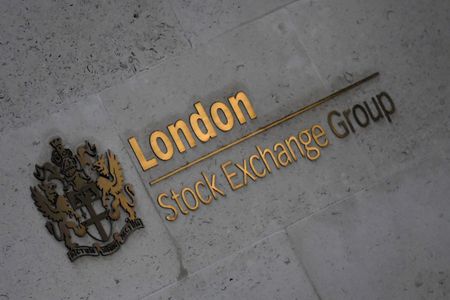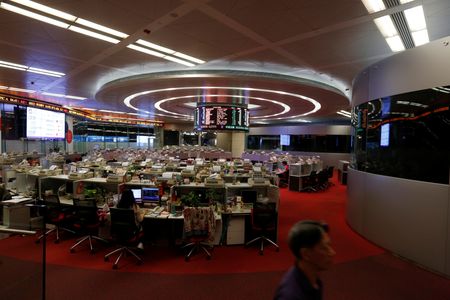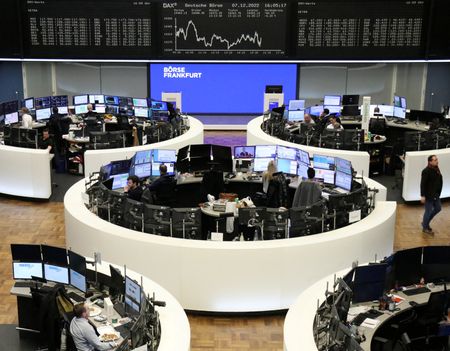(Refiling to fix WRAPUP number to 7 instead of 5)
By Sinéad Carew
NEW YORK (Reuters) -Wall Street’s major indexes closed lower on Tuesday while Treasury yields and gold advanced as investors worried that the U.S. Federal Reserve would keep interest rates higher for longer as fears of further banking sector failures faded.
Energy stocks rallied, however, as oil prices rose on supply concerns.
Stocks had rallied on Monday as investors were relieved by no new signs of bank failures over the weekend and reassured by the sale of assets in collapsed technology industry lender Silicon Valley Bank.
Following weeks of bank sector turmoil after the unexpected failure of two U.S. banks and the rescue of Credit Suisse in Europe, lawmakers quizzed top U.S. bank regulators on Tuesday during testimony in Washington.
Michael Barr, the Fed’s top bank regulator told a Senate panel that Silicon Valley Bank did a “terrible” job of managing risk before its collapse as he fended off criticism from lawmakers who blamed bank watchdogs for missing warning signs.
While the testimony suggested that the bank’s problems may be isolated, it turned investors’ focus right back to worries about interest rate hikes, according to Irene Tunkel, chief U.S. equity strategist at BCA Research.
“If you think it’s just one bad management team, it can stop the deposit run,” on other banks, Tunkel said.
But if the market thinks the crisis is in the rear view mirror, that means that investors also think the Fed “can carry on with their inflation fighting campaign,” she said.
“Barr’s reassured the market that the Fed hasn’t broken anything, which means rates can be higher, Tunkel said.
The Dow Jones Industrial Average fell 37.83 points, or 0.12%, to 32,394.25; the S&P 500 lost 6.26 points, or 0.16%, to 3,971.27; and the Nasdaq Composite dropped 52.76 points, or 0.45%, to 11,716.08.
But MSCI’s gauge of stocks across the globe gained 0.19%, while emerging market stocks rose 0.73%.
In addition, Tuesday’s crop of economic data did little to adjust weak investor sentiment, according to Brad McMillan, chief investment officer at Commonwealth Financial Network.
U.S. consumer confidence unexpectedly increased in March, but Americans were becoming anxious about the labor market, according to a survey released on Tuesday. And the U.S. trade deficit in goods widened modestly in February as exports fell, potentially creating a drag on first-quarter economic growth.
“Everybody’s waiting for a recession, but the economic news continues to be pretty good. It’s hard for the market to bounce when everybody’s looking for bad news even if the bad news isn’t there,” said McMillan.
U.S. Treasuries benchmark 10-year yields advanced on Tuesday but pared gains after the Treasury Department saw solid demand for an auction of five-year notes and investors were cautiously optimistic bank system stress could be contained.
Benchmark 10-year notes were up 2.8 basis points to 3.556%, from 3.528% late on Monday. The 30-year bond was up 0.7 basis point to yield 3.7667% while the 2-year note was up 9.5 basis points at 4.0598%.
The U.S. dollar fell against a basket of currencies for a second straight day as easing worries about the banking system revived investor appetites for riskier currencies.
The dollar index fell 0.341%, with the euro up 0.45% to $1.0845. The Japanese yen strengthened 0.54% versus the greenback at 130.84 per dollar, while Sterling was last trading at $1.2342, up 0.47% on the day.
The Mexican peso gained 0.69% versus the U.S. dollar to 18.23. The Canadian dollar rose 0.45% versus the greenback to 1.36 per dollar.
Crude prices rose modestly, extending sharp gains from the previous session due to supply disruption risks from Iraqi Kurdistan and hopes that banking sector weakness is contained. Crude prices rose more than $3 a barrel on Monday on supply concerns after export halts from Iraq’s Kurdistan region.
U.S. crude futures settled up 0.5% at $73.20 per barrel and Brent ended at $78.65, up 0.7% on the day.
Gold prices rose after two sessions of declines with support from a weaker dollar even as bond yields rose and bank sector fears appeared to recede.
Spot gold added 0.9% to $1,973.49 an ounce.
(Reporting by Sinéad Carew in New York, Amanda Cooper in LondonEditing by Marguerita Choy, Matthew Lewis and Jonathan Oatis)



